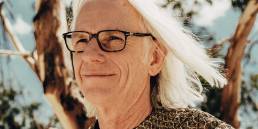His name is the first name you see when the credits role for a top-rated television show, critically acclaimed documentary or international film festival-esque type production.
With a first name which originates from the Gaelic to mean “superior strength” and the Irish meaning of “one vigour”, Angus Gibson’s name represents the strength in the vigour of the film & television industry’s productions which represent the very fabric of our viewing culture.
From Isibaya, Zone 14, Isithembiso and Yizo Yizo to Soweto: A History, Mandela, Amandla! A Revolution in Four Part Harmony and not forgetting Suga which introduced Lupita Nyongo to the world, as the director of these shows, documentaries, films and many others under the production company he co-runs alongside Desiree Maakgraff and Tebogo Mahlatsi, Angus Gibson’s name is at the genesis of genius.
From the moment Gibson graced the set, his quiet yet powerful presence tapped into the intrinsic admiration I have always had for the legacy he effortlessly lives. What was most admirable during the cover shoot was the way in which Gibson spoke only when necessary and carefully considered questions before responding – a considered approach which is indicative of the weight of respect his name holds. Poet Rumi describes this best with the words, “Silence is the language of God, all else is poor translation.”






On a blazingly hot afternoon on a golden shimmering sand-dune attune to the perfect location for a high-fashion photo-shoot, Gibson maintained a posture of pristine professionalism. As his first magazine cover-shoot, the 61-year-old icon by his mere presence silently mentored us all in the art of professional demeanour – a practice which any existing or budding performance arts practitioner would need to master for many days on set which are nothing short of tiring and potentially frustrating.
Hailed as one of South Africa’s premier documentary filmmakers, Angus Gibson is a Durban-born writer, director and company director of The Bomb Shelter Film Company. The Bomb Shelter, with it’s the signature, pay-off line for all its productions “u’grand jo?”(a colloquial term used to ask if one is still having an enjoyable experience) has a name that is somewhat of an antidote to chaos – chaos which could have referred to anything from real, human stories that were not yet translating on our screens authentically to the clichéd portrayal of a people that was perpetuated in many productions yet omitted the fact that the human condition is at best, layered.
To achieve this, Gibson’s work has consistently walked alongside risk. Together with his peers and team, Gibson pioneered significant risk-riding milestones in television that we still enjoy today. Citing the character evolution of Siyabonga Thwala’s Mpiyake Zungu in the Mzansi Magic production, Isibaya, Gibson shared that Thwala’s character becoming “umkhovu” was a calculated risk which ultimately resulted in a move propelled by a gut-feeling. “There were two risks with Isibaya”, he shared, “Exploring pure language and a rural setting – steering outside of a comfort zone. In my gut it was the right thing to do. We could have been crucified for “umkhovu” with people hating it but they ended up embracing it”.
At the launch of the Johannesburg Film Festival, I had a brief chat with Gibson, together with, actor Tiisetso Thoka a previous guest in thebar’s Young Hungry and Talented feature, where Gibson, much to his dismay, shared how I had near put him on the spot earlier that day during the shoot. Saying to Thoka, “She asked me the worst question this afternoon by asking which young, hungry and talented stars we should keep our eyes on. There are so many!”
That type of response, which celebrates the future, is at the core of the legacy of Angus Gibson. Referring to the many talented young actors and actresses whose talent he is discovering during the research process of a new series about the life of Shaka Zulu. A figure of history he wouldn’t have willingly depicted of his own volition due to the sheer gravitas of Zulu’s legacy, Gibson’s respected name caused M-Net to ask The Bomb Shelter to produce it. One insight Gibson points out that his team wish to depict more honestly and powerfully is the prevalence of African spirituality through song and dance – a spirituality which grounded the knowledge and decisions of history’s earliest respected and revered leaders.
Spirituality itself for many is a dialogue between the soul and The Soul’s Keeper. A dialogue that is continuous in the hopes of remaining a compass through life’s journey. When asked what has guided Gibson throughout his career, he responds with an answer that he seemingly is still trying to settle on as he described it to be “A dialogue between myself and the country that I live in”. A country at the heart of his soul.
Forced into conscription during his youth, Gibson’s life took a turn for the better later when during the years of him trying to understand his purpose, what he thought would be the end of him became the start of this trend of “happy mistakes” which have decorated so many milestones in his career. Gibson lived in a village-like area where he became immersed in the world of black South Africans – a world which later went on to inform his fascination with the lived reality of the majority of South Africa’s population.
Such a fascination has contributed towards the installations The Bomb Shelter has created at The Apartheid Museum, Hector Pieterson Museum and LilliesLeaf Museum – guardian landmarks of our country’s history. This fascination also led him into showcasing the post 1994 reality of so many South Africans, through the classic cult series, SABC 1’s Yizo Yizo.
Having first aired on 27th January 1999, this January, we celebrate 20 years of the show which birthed the careers of so many young, hungry and talented performance artists who needed an opportunity to meet their preparation.
Stars such as Meshack Mavuso, who played the role of Javas and originated “u’grand jo?” from Season 1 and Bonginkosi “Zola” Dlamini who played the role of “Papa Action” in Season 2, were introduced to a nation of viewers eager to see their communities expressed unapologetically. When asked what his favourite production has been, Gibson refers back to the trend which has reoccurred in his life by stating, Yizo Yizo. “It was a lot of people coming together at the right time. It was just a happy accident.”
For someone whose career is the mark of excellence, I found myself inspired by the grace embedded in the gratitude he has towards an audience he is consistently trying to reflect and respect in his approach. On the legacy he wishes to continue building, he shares his thoughts in a posture of continuous learning by saying, “I’m grateful that many people watch what we have done. I’m hoping that my best work is in the future.”
thebar. Magazine
thebar. is an online magazine, concerned (read: obsessed)
with the local and international film industries.
Our purpose is to elevate these industries and their leaders
by showcasing high quality, breakthrough content which
elicits a strong response from those working inside
the industry and outside it.



